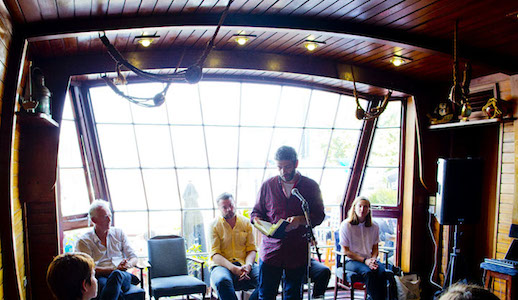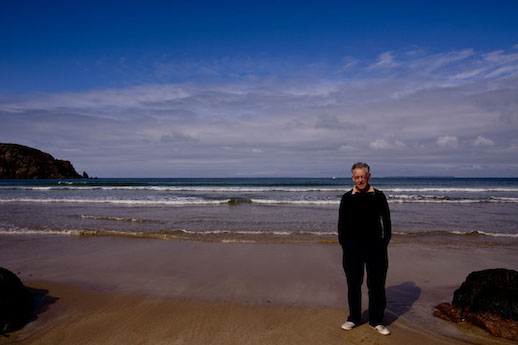Caught by the harbour, St. Aubins, Jersey, 26/27 September 2014
The festival season ended for us last weekend with two Social Club events in the Old Court House pub on the harbour front of St. Aubins, Jersey. The weather was beautiful, the talks were enlightening and the beer was Liberation.
 Mathew, Amy, John, Melissa, Will.
Mathew, Amy, John, Melissa, Will.
John Andrews took charge of proceedings on Friday and welcomed a group of writers who shared their enthusiasm for islands: Will Burns, Mathew Clayton (who talked about his forthcoming book on the subject of Britain’s islands), Melissa Harrison and Amy Liptrot (the Orcadian writer who made her live debut).
 Melissa, Tim, Will, Richard, David’s knee, Emma
Melissa, Tim, Will, Richard, David’s knee, Emma
On Saturday it was the turn of Melissa Harrison to take the chair and introduce guest speakers with a passion for nature, people and place.
Tim Dee gave the first reading of a newly written piece, Atlantic Seaboard, which will feature in the imminent issue of Archipelago magazine.
Emma Warren, a Social Club stalwart, swapped questions for subject and gave the first ever talk on her study of Oxleas Woods that’s been documented so brilliantly on the site this year. The Oxleas field recording accompaniment was a nice touch and something that we’re looking forward to hearing again soon.
David Callahan making his Social Club debut reading from his book Birdwatching in 100 Objects (recently reviewed on this site by Roy Wilkinson). David will be back with us again for a London event in November.
Richard Benson, author of The Valley, made it a hat trick of festival appearances with us this summer and talked fondly of his families engagement with their surroundings in the mining landscape of South Yorkshire.
And Melissa spoke too, reading A Little Paradise – a piece she wrote especially for the event which she has very kindly given us permission us to publish here today.
Thanks as always to John Andrews – ever the professional, and, as he proved on the Sunday a top-notch bass angler to boot. Thanks to Tomo for the photographs.
Thanks to #1 publicist Becky Fincham for pulling it all together and extra special credit to Nina Herve and her Branchage colleagues for creating such a fantastic festival of events. Definitely one for the diary next year.
———————————————————————————————————————
A little paradise, by Melissa Harrison.
She edges the circular lawn by hand; she always has. You get a neater line with the hand shears. First she goes around with the spade; it sinks cleanly into the soil, the result of proper double-digging when she first moved in – an act of foresight she still congratulates herself on. She turns the rich clods over, careful not to introduce any grass into the beds. Then she goes around again, breaking the earth up with a fork and picking out any weeds or stray blades. Finally, the hand shears for a really clean edge. It’s murder on her knees.
The garden is beautiful: everyone says so. Tomorrow she will open it up, and people will pay to view it – all for charity, of course. Each year she overhears them as they drift around, looking at her show of perennials: “Isn’t it glorious? Such a surprise, especially round here.”
Her feelings about the open day are mixed; on the one hand it’s very gratifying to be selected for the programme, which everyone knows has very high standards – but on the other… well. They’re not always the kind of people you’d choose to invite in.
She’d bought the place ten years ago for its potential as a garden; she hadn’t cared too much about the area beyond the fact that it had a supermarket and a surgery, and anyway, she hadn’t had a lot to spend after everything that had happened. Far more important, it had seemed to her then, was the south-facing end plot with an old magnolia, a boggy pond and a couple of silver birches lost amid the weeds. It was overgrown and neglected, with a rusty climbing frame, six ancient bird feeders and a seemingly endless supply of lost toys that came to light as she began ruthlessly to clear it, but she’d wanted something she could create from scratch; something that would be entirely hers.
And it has been worth it. She can look around on a summer’s day like today, when all the weeding has been done, and know where every shrub came from, every flower. It is a little paradise, ordered and calm.
Sometimes she tries to picture what her garden might look like from the air: a beautiful green island amid a sea of concrete estates. Of course, she reminds herself, it won’t be like that at all: there’ll be unkempt yards behind the high-rises, and corners of waste ground, and the bigger green shapes of the city parks. Nevertheless, the image persists.
Standing and easing her back, she looks at her velvet lawn and wonders if it’s worth sinking a metal retainer to keep it neat. It feels like cheating somehow. Creating a garden like hers isn’t about quick fixes; it’s about putting the work in, planning ahead, making careful decisions. That’s what counts.
Of course, she’s addressing James. It’s part of an argument she’s still having with her son in her head: not about gardening, really, but about what’s important. About how to live.
He’d always been impulsive, even as a child; he did things without thinking and then relied on his charm to get him out of trouble – which it usually had. But then, boys will be boys , and in all other ways he’d been an exceptional child, everyone could see it. He’d had such a bright future in front of him – or so she’d thought.
Somehow, he had never quite left home. He got a job in a pub after he’d finished his A-levels – a temporary thing, she’d thought it would be, while he looked for a proper gap-year job. But that had never materialised, and neither had the flat-share he’d talked about.
She hadn’t minded James not moving out; it was his home as much as hers. James’s father had left her when James was twelve, and she’d bought him out, replaced his name with James’s on the deeds. The truth was, she was proud to have a grown-up son who enjoyed her company; and anyway, it was better to have him at home, where she could at least make sure he ate properly. Of course, she had tried to talk to him about the future, but, “You know I can’t bear to be nagged, Mum,” he’d said.
The first time he’d brought her his gambling debts, at 21, she’d paid them off. He’d cried and called himself an idiot, told her how sorry he was. It was good that he’d felt able to come to her, at least; it was good to be able to help. And he’d been so grateful – although of course, the money she lent him had never been repaid.
She’d believed back then that it was a phase. She’d thought that if she could only show her son how to make better decisions, he would – part of her still believes it. And what’s so wrong about trying to pass on the lessons you’ve learned, or the qualities that have helped you in life?
Simple things like being organised, for instance. She has an appointments diary, makes to-do lists, keeps a calendar of friends’ birthdays. Some people are naturally good at that kind of thing, of course, but everyone can learn. Everyone can improve themselves, it’s what life is all about.
Still, there’s no point going over it all again now, she thinks, taking the grass trimmings to the composter behind its tidy trellis screen. The June sky is high and blue above her, the forecast set fair. She wonders if it will be busy tomorrow – if, with this weather, it might be her busiest year yet. Some participants provide tea and cake or home-made lemonade when they open their gardens to the public; she chooses not to. But still they come to marvel at what she has created. ‘I could never make something like this,’ she hears them say to one another. Oh, but you could; you just don’t want to try, she thinks.
She’d had to sell the house in the end. She’d had no choice: it turned out James had borrowed against it, again and again. Strangely, she hadn’t cared – or not that much; the place hadn’t felt like hers for a long time anyway.
Without a proper job to occupy his time he’d fallen in with a bad crowd. He’d started bringing people home at all hours: men her own age, who looked as though they did nothing but sit in the pub all day; girls who should probably still have been at school. She’d tried to welcome his new friends at first, to provide stability, a sense of order, but they came and went as though she didn’t exist. The house began to smell of cigarettes and stale beer, and after a while her friends stopped visiting. She spent the evenings reading gardening books in her room.
In the decade since she sold the old house, she has heard from her son only twice. The first time, a letter arrived enumerating his failures and apologising for each one; it was written in the language of therapy, of support groups, and had no return address. Two years later there was a phonecall late at night, asking for money. She believes – because there is nobody to tell her otherwise – that hanging up the phone is the most selfish thing she has ever done.
Back inside, she washes her hands and pauses for a little while at the sink, looking out through the frame of the kitchen window at what she has made. It is as though the garden tells a story about what’s possible, she believes in her more philosophical moments: that’s why people come. It proves that perfection can come from disorder; that beauty can even be created here, amid a sea of ugliness. And people need to know that, they need to know what can be achieved. It just comes down to the choices you make.
Perhaps he’s seen it in the local paper, she thinks later as she prepares for bed; perhaps, tomorrow, James will come. It would be just like him to surprise her. She will tell him she’s sorry, and he will let her help him. Because it’s never too late, it will never be too late to change.
It is a glorious June evening in the city, warm and lazy and long, and the terraces and estates are alive with music and the sound of people talking. The smell of barbecues drifts from messy back yards; kids loiter at the bus stops, drinking and laughing, and in dark alleyways foxes mount raids on the bins. But behind its fences the garden is perfect – and perfectly quiet. The plants transpire, minutely; invisible birds grip their perches with wirework feet. It is like a stage before the play begins; it is like a long, held breath.
And beneath her circular lawn, beneath the beds, the soil keeps its secret of a million seeds germinating: weeds, wildflowers, relics and renegades. There is no bargaining with that.
